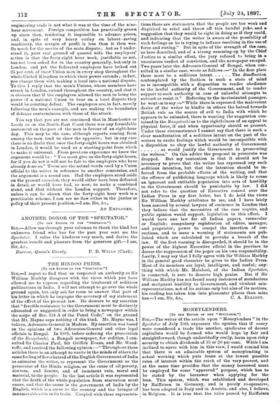THE HINDOO PRESS.
[To THE EDITOR ON THE " SPECTATOR:] SIR,—I regret to find that so respected an authority as Sir William Markby disagrees with the views which you have allowed me to express regarding the treatment of seditious publications in India. I will not attempt to go over the whole ground again, but only ask for room to answer that part of his letter in which he impugns the accuracy of my statement of the effect of the present law. He demurs to my assertion that "forcible resiatance to the Government must be distinctly advocated or suggested in order to bring a newspaper within the scope of Sec. 124 A of the Penal Code," on the ground that Mr. Mayne says nothing of the kind. Mr. Mayne was, I believe, Advocate-General in Madras. My assertion was based on the opinions of two Advocates-General and other legal officials in Bengal. In 1891, before ordering the prosecution of the Ban gobashi, a Bengali newspaper, for sedition, I con- sulted Sir Charles Paul, Sir Griffith Evans, and Mr. Wood- roffe, and received the following opinion :—" Throughout these articles there is an attempt to excite in the minds of others the same feeling of fierce hatred of the English Government of India as animates the writer, to represent the Government as the persecutor of the Hindu religion, as the cause of all poverty, distress, and famine, and of imminent ruin, moral and material, to the people. In the last article it was represented that the death of the whole population from starvation must ensue, and that the cause is the government of India by the English. which is a curse to the country and the bringer of innumerable evils in its train. Coupled with these representa- tions there are statements that the people are too weak and dispirited to rebel and throw off this hateful yoke, and a suggestion that they would be right in doing so if they could, and indicating that the writer is aware of the possibility of such feelings as he is trying to inflame resulting in the use of force and rioting." But in spite of the strength of the case, as here described, and of a strong summing-up by the Chief Justice to a similar effect, the jury refused to bring in. a unanimous verdict of conviction, and the newspaper escaped. Two years later the Advocate-General of Bengal, when con- sulted in a similar case, wrote as follows :—" In the first place
there must be a seditious intent The disaffection contemplated by the Section is such a state of mind as it, incompatible with a disposition to render obedience to the lawful authority of the Government, and to render support to such authority in case of unlawful attempts to subvert or resist it." Referring to the incriminated passages,. he went on to say :—" While there is expressed the malevolent desire of the writer to kindle in others the hatred towards British rule as the source of evil to India with which he appears to be animated, there is wanting the suggestion con- tained in the Bangobashi as to the rightfulness of an appeal to physical force, if and when opportunity should so present. Under these circumstances I cannot say that there is such a, clear manifestation of a seditious intent on the part of the writers to excite feelings which would be incompatible with a disposition to obey the lawful authority of Government
as would justify the Government in prosecuting the writers." On this advice the proposal to prosecute was dropped. But my contention is that it should not be necessary to prove that the writer has expressed any such seditious intention, but that the intention should be in- ferred from the probable effects of the writing, and that the offence of publishing language which is likely to rouse an ignorant and excitable population into acts of hostility to the Government should be punishable by law. I did not refer to the question of Executive control over the Indian Press in my first letter, but I do hold the views Sir William Markby attributes to me, and I have lately been assured by several lawyers of eminence in London that they believe that the necessities of the case require, and public opinion would support, legislation to this effect. I would have one law for all Indian papers, vernacular or English ; compulsory registration of editor, manager, and proprietor; power to compel the insertion of cor- rections, and to issue a warning if statements are pub- lished which are calculated to provoke a breach of the law. If the first warning is disregarded, it should be in the power of the highest Executive official in the province to decree the suppression of the paper on his own responsibility. Lastly, I may say that I fully agree with Sir William Markby in the general good character he gives to the Indian Press. Most of its members are loyal, intelligent, and useful; any- thing with which Mr. Malabari, of the Indian Spectator, is connected, is sure to deserve high praise. But if Sir William Markby has not found many instances of mendacious and malignant hostility to Government, and virulent mis- representations, not of its actions only but also of its motives, his reading has taken him into pleasanter places than mine


































 Previous page
Previous page